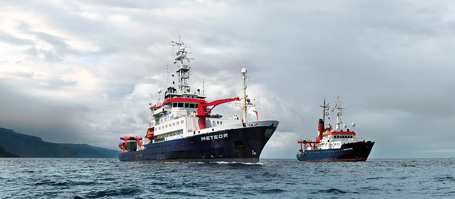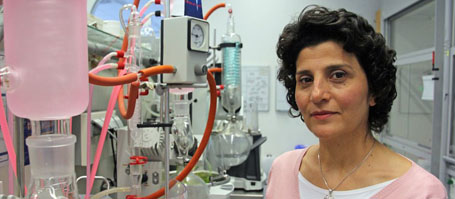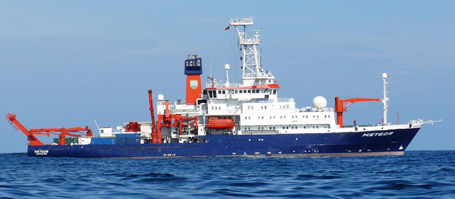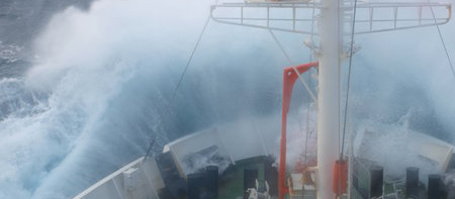The Chairman of the DFG Senate Commission on Oceanography and Director of the MARUM Center for Marine Environmental Sciences, University of Bremen, Prof. Dr. Michael Schulz, and the Director of the GEOMAR Helmholtz Centre for Ocean Research Kiel, Prof. Dr. Peter Herzig, outlined today in Kiel the planning for the replacement of other research vessels. The focus was on the planned replacement for the two ships POSEIDON and METEOR.
Germany has a large fleet of research vessels for worldwide use in all seas and oceans, from small, regionally operating units for research along Germany's coasts to advanced, ocean-going special ships that can reach even the most remote marine areas. This enables Germany to carry out marine research at the highest level, and to answer important, socially relevant issues which are for this and future generations of central importance for humanity. These include the effects of climate change, the supply of the world population with food and raw materials, and the protection of coastal communities against natural hazards. Maintaining a modern fleet of research vessels is a key element for the scientific work. In recent years, the important initial steps have already been taken - including the construction of the research vessel MARIA S. MERIAN (2006) as well as last year’s commissioning of the research vessel SONNE and the replacement of the research icebreaker POLARSTERN which is currently in the bidding process.
Since the application range of research vessels has been significantly expanded due to today’s advanced technology, the Federal Ministry of Education and Research (BMBF) decided to build another ship by 2020 to replace the then more than 40-year-old POSEIDON and the more than 30-year-old METEOR. The research tasks of METEOR and POSEIDON can then be concentrated onto one ship. The planning for this replacement construction is scheduled to begin in the coming year.
"We are pleased that the federal government has given high priority to marine research so that we can carry out excellent marine research from modern research vessels in the future as well," said Prof. Dr. Michael Schulz, Chairman of the DFG Senate Commission at the Oceanography and Director of the MARUM - Center for Marine Environmental Sciences at University of Bremen today at a meeting in Kiel. "Exploration of the Sea is a national task which the federal government promotes through research and also through significant funding for research infrastructure. Through means of a qualified review process, the scientific community ensures that the research time can be optimized for the best and most pressing issues," said Prof. Schulz.
"For us it is important that the ship planning now rapidly gains momentum, so we can soon replace these aging platforms," added Prof. Dr. Peter Herzig, Director of GEOMAR Helmholtz Centre for Ocean Research Kiel. "We are also pleased with the decision announced today for Kiel as a home port of the new research vessel. This builds on the long tradition of marine research in Kiel. Of course, the ships will be available to all facilities because the funds for the construction of larger ships will be provided by the federal government, and funds for their operation come from the federal government and the German Research Foundation", Herzig continued.
"There are no numbers yet regarding the size or cost of the new ship," says Prof. Peter Herzig. "The planning process which starts next year will provide some clarity." The two researchers explained that the decision taken now is a good and positive step to ensure the performance of German marine research in the coming decades.
Links:
www.deutsche-meeresforschung.de/de/forschungsschiffe German Marine Research Consortium – Research Vessels
Contact:
Dr. Andreas Villwock (GEOMAR, Communication & Media), Phone: +49-(0)431 600-2802, presse@geomar.de
…



